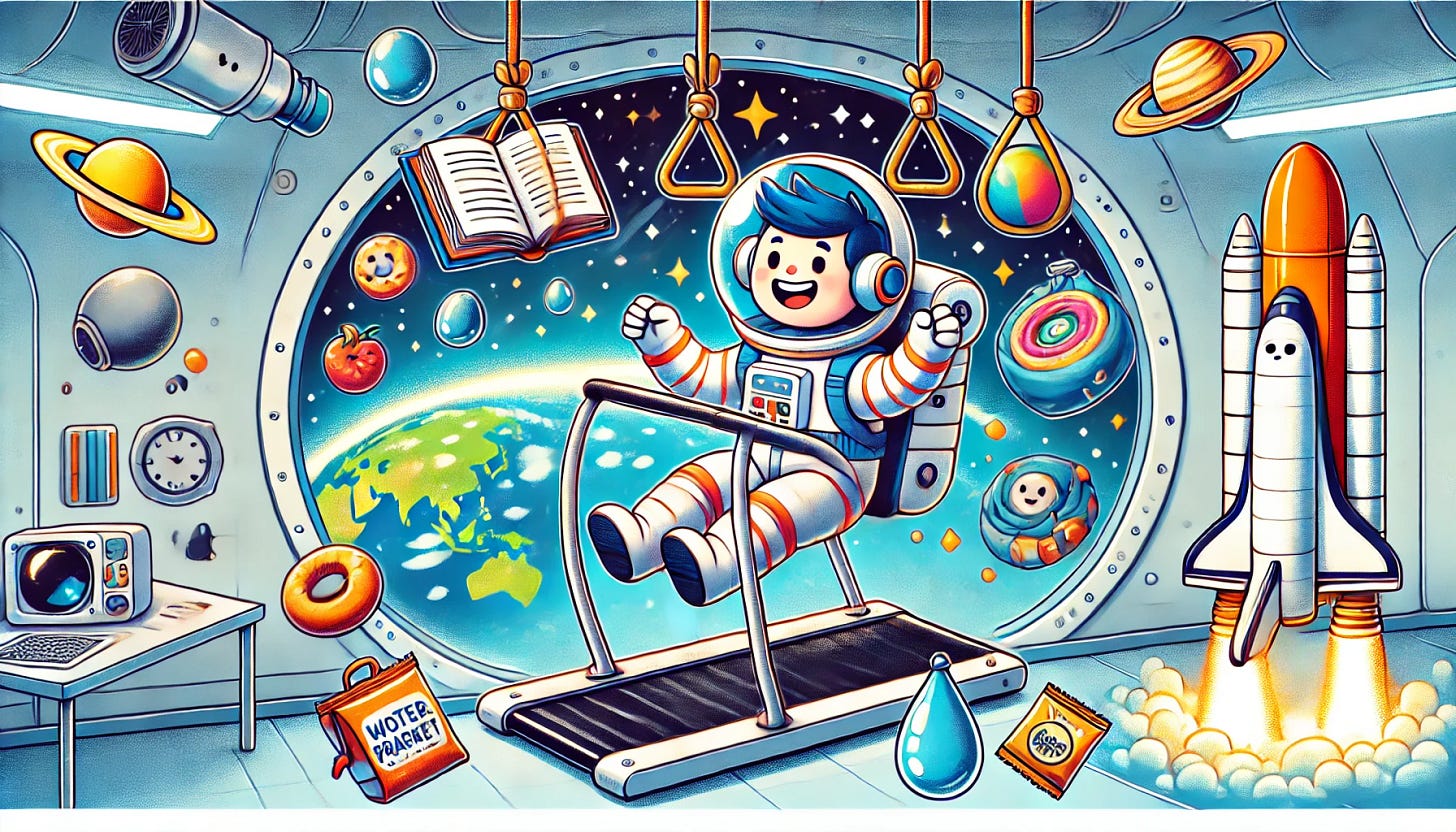How Does Space Impact the Human Body?
Imagine you’re an astronaut, zooming into space in a rocket. You float around inside your spaceship because there’s no gravity pulling you down. It sounds fun, doesn’t it? But did you know that being in space changes how your body works? Let’s explore how space impacts the human body and learn some cool facts about life as an astronaut!
Hello my friends!
For a quick note, welcome to Tidbits with Titus, a podcast and newsletter where we tackle the big, curious questions kids ask every day in fun, bite-sized ways! I’m Alexander Titus, but I go by Titus. I’m a scientist, adventurer, and a huge fan of making science, technology, and life accessible to all ages. From “How does electricity work?” to “What are taxes?” and even “Why is the sky blue?” I’m here to dive into these wonder-filled questions with engaging stories and simple explanations that spark curiosity and make learning a joy. This effort is all about creating a space where families can learn together, discover the magic of the every day, and find thoughtful ways to explore the world’s big mysteries. Let’s make curiosity a family tradition—one tidbit at a time!
Just so you know, these podcast episodes are all AI-generated using Google’s really cool NotebookLM technology. That means there are some errors in how words are said, but that is part of the fun!
If your little ones have questions that you want help answering, shoot me an email at questions@tidbitswithtitus.com and I’ll see what I can do!
You can subscribe to the newsletter that has this information as well at tidbitswithtitus.com.
Also please share with anyone you think would be interested. The more the merrier!
Cheers,
-Titus
What Happens to Your Body in Space?
Here on Earth, gravity pulls everything down, including you! Gravity helps keep your body strong and working properly. In space, there is very little gravity, which is called microgravity. Without gravity, your body has to adjust to a whole new way of living.
Let’s look at the changes:
1. Your Bones and Muscles Get Weaker
On Earth, your bones and muscles stay strong because they work against gravity. Every time you walk, run, play, or even stand up, you’re using your muscles and bones.
In space, your body doesn’t have to work as hard because there’s no gravity. As a result:
Bones lose calcium and become weaker, like chalk. This is called bone density loss.
Muscles shrink because they’re not being used as much.
That’s why astronauts exercise every day in space! They use special machines like treadmills and resistance bands to keep their bodies strong.
2. Your Height Changes
In space, your spine stretches out because gravity isn’t compressing it. This makes astronauts grow taller by up to 2 inches! But don’t get too excited—they shrink back to their normal height when they return to Earth.
3. Your Fluids Move Around
On Earth, gravity pulls your blood and other fluids down toward your legs. In space, these fluids float upward. This can make your face look puffy and your legs look thinner. Some astronauts call it the "moon face." This fluid shift can also cause:
Pressure in the head, which can affect eyesight.
Nasal congestion, like having a stuffy nose.
4. Your Heart Works Differently
Your heart is a muscle that pumps blood around your body. On Earth, it works against gravity to pump blood upward to your head. In space, without gravity, the heart doesn’t have to work as hard. Over time, it might become weaker.
How Does Space Affect Your Senses?
Space changes how you see, smell, taste, and feel things. Here are some ways it can impact your senses:
1. Vision Changes
Some astronauts find it hard to see clearly in space. The fluid shift mentioned earlier can press on the back of the eyes, changing their shape. This is called "spaceflight-associated neuro-ocular syndrome" (SANS). It’s like wearing glasses that don’t fit right.
2. Food Tastes Different
Astronauts often say that food tastes bland in space. Why? The fluid shift can make their noses feel stuffy, and without a good sense of smell, food doesn’t taste as strong. That’s why astronauts love spicy foods and sauces like hot sauce—it gives their meals more flavor!
3. Hearing Changes
Space is very quiet because there’s no air to carry sound. Inside the spaceship, astronauts can hear noises, but the way sound travels is a little different without gravity.
4. Balance and Motion
Your inner ear helps you balance on Earth. In space, the fluid in your ear floats, confusing your brain. This can make astronauts feel dizzy or disoriented at first. This is called "space adaptation syndrome," or space sickness. Luckily, most people adjust after a few days.
What Happens to Your Body Over Time?
Short trips to space cause small changes in your body, but long missions, like going to Mars, can have bigger effects. Let’s look at what happens during long space missions:
1. Radiation Exposure
On Earth, our atmosphere protects us from harmful space radiation. In space, astronauts are exposed to more radiation, which can damage cells and increase the risk of health problems. That’s why spaceships and spacesuits are designed to block as much radiation as possible.
2. Mental Health Challenges
Living in a small spaceship far from Earth can feel lonely and stressful. Astronauts miss their families and the comforts of home. They have to work hard to stay positive and focused. Teamwork, video calls with loved ones, and fun activities like movie nights help keep their spirits up.
3. Immune System Changes
Astronauts’ immune systems can weaken in space, making it harder for their bodies to fight off germs. Scientists are studying this to find ways to keep astronauts healthy during long missions.
Fun Facts About Space and the Human Body
Astronauts Sleep Floating! In space, there’s no “up” or “down,” so astronauts sleep in sleeping bags attached to the walls. They can even sleep standing up!
Your Voice Sounds the Same: Even though sound travels differently in space, your voice doesn’t change. So if you sing “Twinkle, Twinkle, Little Star” on the International Space Station, it will sound just like it does on Earth.
Space Fever: Astronauts’ body temperatures can rise slightly in space, like having a mild fever. Scientists think this happens because of the stress and changes the body experiences in microgravity.
How Do Astronauts Stay Healthy?
To keep their bodies in good shape, astronauts follow strict routines in space. Here’s what they do:
1. Exercise Every Day
Astronauts work out for about two hours a day to keep their muscles and bones strong. They use special equipment like:
Treadmills with straps to hold them down.
Stationary bikes without seats (because you don’t need to sit in microgravity!).
Resistance machines to mimic weightlifting.
2. Eat Nutritious Food
Astronauts eat healthy meals packed with vitamins and minerals to keep their bodies strong. The food is specially packaged so it doesn’t float away! They eat things like dried fruits, nuts, and vacuum-sealed pasta.
3. Take Care of Their Mental Health
Astronauts talk to psychologists before and during their missions. They also keep journals, watch movies, and play games to relax.
What Happens When Astronauts Return to Earth?
Coming back to Earth can be tricky. After months in space, the body needs time to readjust to gravity. Here’s what happens:
1. Feeling Heavy
Astronauts feel super heavy when they return because their muscles and bones got used to microgravity. Even lifting an arm can feel like hard work!
2. Relearning Balance
Astronauts might feel wobbly and have trouble walking at first. Their inner ears need time to adjust to Earth’s gravity again.
3. Recovery Exercises
Astronauts do special exercises and physical therapy to regain their strength and balance. It can take weeks or months to fully recover.
Why Study the Effects of Space?
Understanding how space affects the human body helps scientists prepare for longer missions, like trips to Mars. It also teaches us more about how our bodies work. This knowledge can even help people on Earth, such as finding new ways to treat bone loss or muscle weakness.
In Conclusion
Space is an incredible place, but it’s also challenging for the human body. From weaker bones and muscles to changes in vision and balance, astronauts face many obstacles. Thanks to science, exercise, and teamwork, they can stay healthy and continue exploring the universe.
Who knows? Maybe one day you’ll be an astronaut, too! How cool would that be?














Share this post